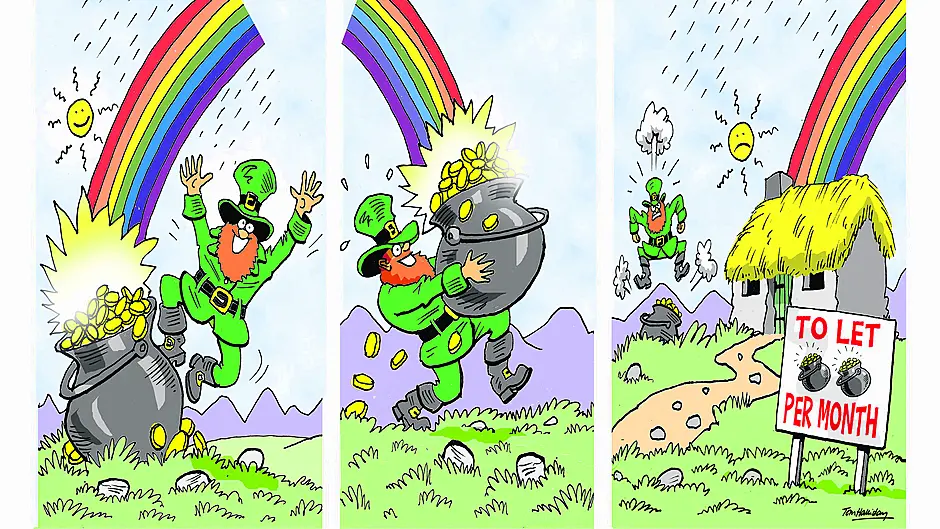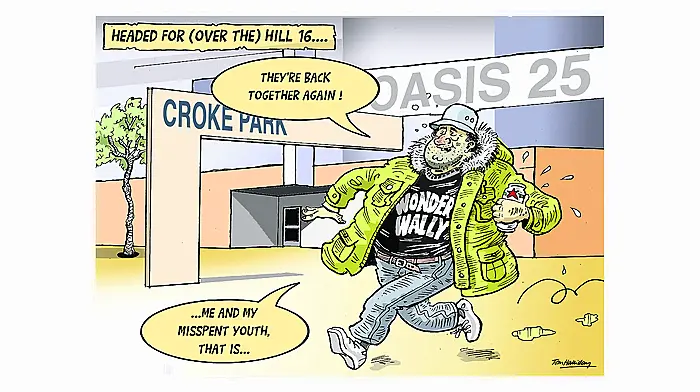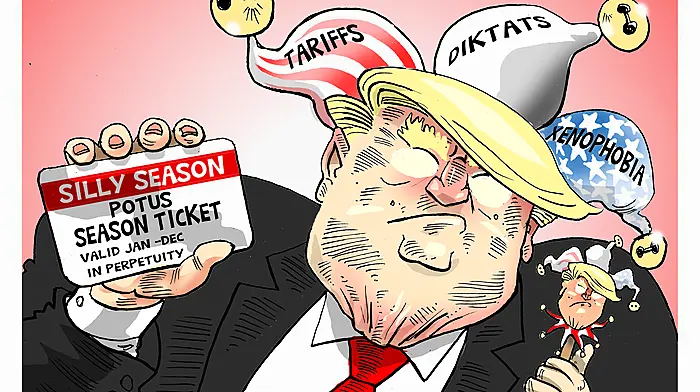IT’S hard to believe that only this time around 15 years ago Ireland was completely broke and the subject of international ridicule. From the dizzying highs of the Celtic Tiger to the crushing lows of the Anglo Irish Bank disaster, we had been on a stomach-churning collective rollercoaster ride – from economic miracle to outright basket case faster than you could say ‘Where the hell is Charlie McCreevy gone?”
We don’t do things in half measures in this country.
Fast forward to the year 2023 and the country is now apparently awash with moolah. The streets are paved with gold and the savings accounts of Mr Joe and Mrs Josephine Soap are literally bursting at the seams. Or so they were saying in the papers over the weekend.
The Department of Finance is projecting that from 2023 to 2026 there will be a cumulative budget surplus of no less than €65bn which, in case you need reminding, amounts to sixty-five thousand million euro. These are Dr Evil numbers. We could build an underground lair beneath the Blaskets and threaten the world with armageddon with that kind of cash.
Of course, it’s very difficult to equate any of these eye-watering projections with the actual lived reality which sees most of us browsing the beans aisle in Aldi with a pen and paper and a worried frown. If you’re like me, you open your utility bills every month from the other side of the room, like you’re defusing a bomb.
Says you, some fella somewhere must be making a fortune!
You might think this would be a cause for popping the champagne corks in Merrion Square. I mean, doesn’t all this ostensibly point to a country that is being very well managed? An economy that is in rude health? A nation that is, to borrow a phrase from macroeconomics, ‘absolutely feckin’ flying it, lads?’
Not if nobody is feeling it in their pockets, I’m afraid. And herein lies the challenge for the government in the months ahead.
We have the funds, in theory, to do transformative work in housing and in health, in particular. We also have the financial resources to make the sort of key infrastructural investments that could lay the ground for us to tackle the climate emergency in the years ahead. But will we?
Take the latest new housing plan worth €1bn which is targeting the cost of building and vacant homes. Trying to sort through these housing plans is like trying to pick out a health insurance policy in our equally confounding public/private system of healthcare, which has one foot in socialism, another firmly entrenched in the market and a rather large hand in our pockets.
This new housing plan, on the face of it, looks like more tinkering at the edges, eliminating water connection fees and increasing subventions to builders where they develop cost-rental apartments. The government will say that all of these measures will have a cumulative effect towards helping solve the crisis.
But these cost rental properties are designed to be 25% below market rates. By way of example, rental properties in my corner of Dublin are currently running at about four times my monthly mortgage. We’d struggle to rent a two-bedroom apartment on two incomes.
It feels like a much more fundamental ‘grasp the nettle’ approach is required here. We saw during Covid that mountains could be moved when the government stepped in, set its mind to something in anger and had public support through a well-communicated action plan.
You’d wonder if we’ll look back on this time as a great lost opportunity to set ourselves up for a generation. The clock is ticking for the current administration but they’ve never had a better chance to do their jobs and make a difference.
Watt the blazes ...?
‘LAWS are like sausages, it is better not to see them being made,’ famously quipped Otto von Bismarck and this week we got a tantalising look behind the scenes of our Civil Service when Robert Watt faced a fairly brutal grilling over the handling of Tony Holohan’s planned appointment at TCD.
The session is available for catch-up viewing on Oireachtas TV and is well worth a look. As always, it turns out our politics can be a lot closer to an episode of The Thick Of It than many would care to admit.
And although there seem to be procedural objections to how Holohan’s role in TCD came about, there’s nobody looking to move Mr Watt on, especially given his performance behind the scenes in health.
It’s also worth noting Watt’s central role in crafting the economic recovery plan after the 2008 crash.
It’s right and proper to call out shortcuts being taken, especially in a country that operated on the basis of ‘jobs for the lads’ for the first one hundred or so years of its existence, but many believe we need spiky characters to chop through the deadwood of our public service every now and again.
Lessons were learned, as they say.
Celebs are ticked off
IT was the week that the Blue Ticks were removed from Twitter.
I barely noticed myself because it’s a place I spend very little time these days – I prefer the world of real-life birds and actual parks where strangers don’t shout at you for no reason (well, it depends on what park you go to I suppose).
See, the original plan was that everyone who was worth it was verified with a blue tick – Presidents, rock stars, celebrity astrologers, journalists etc. Then Elon Musk took over and decided anyone could have a blue tick if they were willing to fork out a tenner a month for the privilege.
He was returning the town square to the people, albeit from a mansion somewhere in California.
So last week, Twitter began what I call Operation Humiliy and began de-frocking the great and good and rendering them blue tick-less like the rest of us muck savages. Except they didn’t, because shortly after Twitter started reinstating blue ticks again, presumably for fear there could be some sort of run on celebrities.
Then, the celebrities started to come out in opposition to their reinstatement as our betters, declaring that they definitely weren’t paying for the blue ticks.
Like most people who hate Twitter and can’t stand Musk, they took to the only place they could think of to make their point, namely ahem ... Twitter.
We all really need to take a good, long look at ourselves, lads.
Of course, from the outside, it looked like a disaster for Twitter, just as the exploding Space X rocket earlier in the week looked like a disaster for Musk’s other concern. Thing is, in both examples, Musk seems to have achieved a much broader aim, namely having absolutely everybody talk about him.
It’s the attention economy, stupid.










